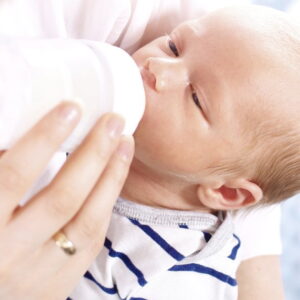
Mom’s question:
Can anyone help me with remedies for a very congested baby?
My baby boy just turned seven months and is getting over the flu and cold. His nose is still stuffed and runny, and he has chest congestion.
I’ve been to doctors, and they seem to keep giving me cold-type medicine, but I don’t think he needs it anymore. I just want to help his congestion so that he sleeps and eats better.
What can I do?
How To Help A Congested Baby
How long can congestion last?
As you have noticed, congestion often lasts long after the flu or cold is over.
It usually takes up to two weeks for the congestion to go completely away after a bad cold. Your baby may cough and wheeze some until all the congestion is gone. He should be fine; keep an eye on his temperature.
You need to take him back to your pediatrician if he starts to run a fever. If he has rapid breathing more than 70 times per minute or you notice he is using all his chest muscles to breathe, then he needs to be rechecked.
6 Home Remedies for a Very Congested Baby
It is tough to have a very congested baby. Like adults, the congestion makes it difficult for them to sleep and eat.
Here are some home remedies to help your congested baby:
1. Hot Shower and Steam
Run a hot shower, sit in the bathroom, and let him breathe in the steam. This helps with congestion.
2. Saline Drops
You may want to use saline nose drops when he has a stopped-up nose.
You can make saline drops by adding ½ teaspoon of table salt to 2 cups of boiled water.
After the solution has come to room temperature, put one drop in each nostril, then suck with the 1-ounce rubber syringe (suction bulb).
Do this before each feeding and at bedtime. This will make it easier for the child to breathe.
3. Breastmilk Drops
If you still breastfeed, you can use breastmilk drops too. Use breastmilk the same way as you would saline drops. Breastmilk is very efficient in reducing congestion in babies.
4. Elevate the Head End of the Baby’s Bed
You can try to help your baby breathe better at night by elevating the head end of his crib a bit.
Don’t do it by placing him on a pillow, though, since he could fall under it at night. (Even if the risk of sudden infant death syndrome is quite low for a 7-month-old, it is a very unnecessary risk to take.)
Instead, put a pillow under the mattress or use something very stable beneath the bed’s legs.
5. A Warm Bath
A warm bath in a bathroom with warm, humid air can also help with congestion and make it easier for your baby to sleep.
This can be a lot more fun for you and your baby than just sitting in the bathroom with the shower running.
6. A Warm Vapor Humidifier
Finally, putting a warm vapor humidifier into your baby’s room may also be a good idea, as it will help decongest his nose and will make his sleep healthier.
I would start it maybe 30 minutes before putting your baby to sleep to get the humidity up.
Just do not use any essential oils with it because some of those may be dangerous for newborns or cause an allergy.
I hope he feels better soon.
Paula
(Answer approved by our Medical Reference Team)
More On Babies With Cold Or Flu
Hey moms and dads, do you have any more tips on remedies for a very congested baby? Add them below! :-)

Paula Dennholt founded Easy Baby Life in 2006 and has been a passionate parenting and pregnancy writer since then. Her parenting approach and writing are based on studies in cognitive-behavioral models and therapy for children and her experience as a mother and stepmother. Life as a parent has convinced her of how crucial it is to put relationships before rules. She strongly believes in positive parenting and a science-based approach.
Paula cooperates with a team of pediatricians who assist in reviewing and writing articles.




My baby is almost 3 weeks old and she sounds congested. She’s not coughing but when she cries it sounds like she’s sick and I’m really worried and don’t know what to do. She also won’t stop crying.
Hi,
In newborns, noisy breathing that happens occasionally is normal. On the other hand, noise breathing caused by troublesome breathing problems is usually persistent and hence you would most likely hear it all the time. Nevertheless, if you are concerned about any breathing problem in your baby, be sure to contact your pediatrician. And really that pays for any age baby. It is always better to get information and reassurance from the doctor.
There are some interesting facts about the normal baby crying that would be useful for you to know. The time spent crying for baby peaks in the first three months. A baby normally cries about 2 hours per day during the first three months and the crying occurs more frequently in the late afternoon and evening. Most babies cry for 30 minutes or less in any period of the day.
There are several reasons that could explain baby crying. For example, it is possible that babies are less able to regulate crying once started. If your baby appears healthy, does not have a fever, is not lethargic and if you are able to calm her down, the most plausible explanation of your baby crying is that your baby has a bit of tummy pain or other discomfort and the two of you haven’t really learned how to communicate yet.
It takes time to recognize the different cries a baby makes, hunger, discomfort, fear. And the more anxious you are, the more baby picks it up and will be unsettled.
If your baby cries for extended periods every day and can’t be settled, it can be infant colic, which you can read more about here.
So the best thing is to get her checked out, then if nothing is wrong you can relax and focus on lots of body contact and getting the hang of feeding, etc. It is a pretty full-on time with a newborn, and she will need heaps of cuddle time and feeds while she adjusts to being out in the big wide world!
Hope this helps,
Paula
The advice given here has truly settled me down. I was really upset and praying what did I do wrong, 4 am feeding and what I heard from her will still keep me cuddling her to keep listening and once I moved her a little and readjusted the way I was holding her, she sounded better but if she starts the cough again I’ll go to the hospital. Better to get her checked out and feel reassured if on doubt take to hospital.
Advice you’re given made me feel much better